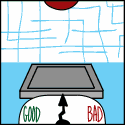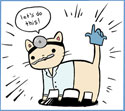|
US Foreign Policy posted:I'm adopting a 3 year old Corgi from the local C.A.R.E. and will be using a crate for the first time. Do I want to put a dog bed of some sort inside of it? From the puppy faq I got the impression you don't want to put in any bedding that can be torn up, but I'm not sure if that's puppy-only Really depends on the dog. My Corgi doesn't like to sleep in her crate unless there's some kind of comfortable bedding in there--stubborn princess that she is. She doesn't destroy things though, or get into trouble at night, so we let her free roam the house with her crate open as an option. Most of the time she just sleeps on a dog bed in the living room. Crate training is a good idea with any new dog though. If you put bedding in there, just make sure to supervise at first determine what the dog does with it, if anything.
|
|
|
|

|
| # ? May 24, 2024 13:25 |
|
Cincle posted:I'm an explosives detection dog handler and I need to communicate with my dog at all distances and in all weather conditions. When there's a storm or covert ops I don't want any sound if possible. That's really cool. What about a vibrating pager on her collar that allows you to send different short or long pulse combinations like morse code? Should be fairly easy to train her on a half dozen or so different codes.
|
|
|
|
flashy_mcflash posted:Thanks for your reply! I've always been a bit wary of going down the medication route, but that might be what we have to do. Have you noticed any side effects or anything from the prozac? I would really hate to see her lose her (frankly, adorable) energy level outside of this light situation. We didn't notice any negative side effects. We did notice that she was more able to relax in general, which is what we wanted. She's a very hyper alert dog and that continues, she just doesn't feel the need to be on alert 24/7 and ready for action at all times. She can now take naps (and she takes many) without popping her head up at every sound/movement. She definitely doesn't have that sedated look and still plays as intensely as she ever did. Another medicine we use only for high stress situations, clonidine, does make her a little sleepy and you can tell that she's a tiny bit more relaxed than is natural. We don't use that on a daily basis. If you do feel like you want to try out medication, then talking to a veterinary behaviorist is best, though I have to admit that we talk to a certified animal behaviorist (no vet training) + regular vet with psychiatric experience because we've been working with them for a while and vet behaviorists are expensive. There are other drugs that may work better for OCD beside prozac (which we use mainly for the hyper alertness and reactivity) and you'll need to outline a good training regime with an expert.
|
|
|
|
I have a 4-year-old Greater Swiss Mountain Dog on whom I discovered a small mass yesterday. It's on her lower right-center chest (far enough away from where a lymph node would be, I think) and about half the size of a small egg. It's not on a place where I'd usually be touching her, so I can't say how fast it's grown. It doesn't seem to bother her at all. I'm going to have a vet look at it on Monday, naturally. From always-reliable internet research, it seems to fit the description of a lipoma - it has that "kind-of-squishy balloon in oil" feel. (It doesn't feel as firm as a sebaceous cyst.) My question: what's generally considered the best way to see if this is cancerous? I've read that needle biopsies are the most common way, but I've also read that needle biopsies aren't enough. I ask because I can't go to our main vet for this; she refuses to biopsy any growth in favor of excision (as I discovered when our other dog developed a few moles). Obviously, if the growth's malignant, it needs to come out ASAP, but if it's benign, though, I'd prefer to monitor it for the time being. (If that's an utterly wrong decision in itself, please let me know.) I do trust the vet I'll be seeing for this, but I'd feel more comfortable with a bit more information; I don't want to settle for a needle biopsy if it's unreliable for diagnosis in this case. Thanks for any assistance.
|
|
|
|
An aspirate and a biopsy are different things. In a fine needle aspirate (FNA), which is probably what you are thinking of, you are getting a sampling of the types of cells in the mass without the organization of the cells. Some types of masses don't aspirate very well and some do. A biopsy gives a sampling of the cells in their orientation inside the mass, so can often give a better idea of just what the mass looks like on a microscopic level. There's no real way of even guessing if a FNA is going to be appropriate for the type of mass without an experienced veterinarian seeing and feeling it, so that's going to be your best bet.
Topoisomerase fucked around with this message at 00:16 on Dec 18, 2011 |
|
|
|
Both of my dogs seemed to have developed really awful breath at the exact same time. Before a few days ago, their breath was completely odorless. I know bad breath can be caused by dental problems, but it doesn't seem likely that they both would develop that at the same time. Also both smell exactly the same, like they've been eating poo poo or something (though from cleaning up after them in the yard it appears all poo poo is in tact). They eat the same food but they've been on it for awhile now. Any ideas of what could be causing it?
|
|
|
|
Topoisomerase posted:There's no real way of even guessing if a FNA is going to be appropriate for the type of mass without an experienced veterinarian seeing and feeling it, so that's going to be your best bet. Yes, I'm seeing one on Monday, as stated in the OP. Let me rephrase: are aspirates the usual way of checking out lipoma-type masses, or is another method more prevalent or effective?
|
|
|
|
Figured I'd throw it out here, just in case anyone had any suggestions for this: Does anyone have experience with neurological-issue kittens and litterbox training? There's a foster kitten I know who has made amazing recoveries from some kind of brain damage: she's well on her way to doing everything a cat should (if in a shortbus way), but she seems to have little or no interest in using the box. She has older kitten role models that she lives with but she still just pees wherever she is and goes back to playing. I gather today she made the first gesture towards scratching over the spot where she peed, so mmmmaybe she's starting to think about what she's doing? Here she is: cute, no?  More technical info, but what I have is patchy since I'm not the one taking care of her: She showed up with obvious problems and very quickly tanked to a nearly-immobile state, but there was enough going on brain-wise that the vet thought it was worth trying antibiotics and home nursing to see if she'd pull through inexpensively. My understanding is that a neurologist was able to identify the problem as a lesion of some sort in the back left area of her brain; they're pretty sure it relates to Toxoplasmosis because she's responding very well to treatment for that. Hard to judge how old she is, because she's tiny and obviously developmentally way off. e. My impression is that she has physical bladder/bowel control, in that she'll pause, do her business, and then go back to whatever doofy kitten stuff she's up to. She's not incontinent. But she completely missed the memo that it's good to go somewhere in particular to do that. She's also seemed to be slow to process information coming in (like, delayed reactions to sights and sounds) though that's improved a bunch, so it could also be that she's not real quick to recognize physical sensations telling her that she needs to go. I know it's kind of a long shot that anyone would have dealt with exactly this problem. Andrias Scheuchzeri fucked around with this message at 03:05 on Dec 18, 2011 |
|
|
|
For the past few days, my 13 year old dog has been panting and pacing randomly. She sits and pants heavily for no apparent reason. She doesn't have to go outside (and all that looks normal), it's not time for food, and she always has water available. This happens at all hours. I thought maybe she was anxious or something, so I would sit next to her and give her attention, but then she'd get up and move away after a few minutes anyway. I'm in Wisconsin, so she's not hot. She's otherwise pretty drat healthy for an old girl, and I suppose a vet visit is in our future if this continues. Any ideas in the meantime?
|
|
|
|
DemonDarkhorse posted:For the past few days, my 13 year old dog has been panting and pacing randomly. She sits and pants heavily for no apparent reason. She doesn't have to go outside (and all that looks normal), it's not time for food, and she always has water available. This happens at all hours. I thought maybe she was anxious or something, so I would sit next to her and give her attention, but then she'd get up and move away after a few minutes anyway. I'm in Wisconsin, so she's not hot. She's otherwise pretty drat healthy for an old girl, and I suppose a vet visit is in our future if this continues. Any ideas in the meantime? Is she on medicine for arthritis? Our old Labrador did that exact same thing when his arthritis got too painful for him (to handle unmedicated). The vet prescribed Deramaxx and it stopped almost immediately.
|
|
|
|
Yep, our old lady dog used to sit and pant when she was in pain from one of her various ailments. Probably best to get her in to be checked out. Panting and pacing are pain signals.
|
|
|
|
Blenheim posted:Yes, I'm seeing one on Monday, as stated in the OP. Let me rephrase: are aspirates the usual way of checking out lipoma-type masses, or is another method more prevalent or effective? And I'm saying it depends on the individual vet, the vet's experience and what they think the mass feels and looks like. I got a stern-talking-to on summer clinics for saying a mass "felt like a lipoma," haha.
|
|
|
|
Andrias Scheuchzeri posted:Figured I'd throw it out here, just in case anyone had any suggestions for this: How old is the kitten? I know my husband and I had at least one foster kitten who had severely stunted development (vet thought he might not make it), and was a good month behind the rest of his litter in several areas. He was eventually fine and used the litter box like a normal kitten, and did other normal kitten things, but I want to say we fostered him for an extra 4-5 weeks after we'd taken the rest of the litter back to the shelter to be adopted. I don't think it was a neurological issue in that case, but just saying that we've seen some extremes in foster kittens.
|
|
|
|
Topoisomerase posted:And I'm saying it depends on the individual vet, the vet's experience and what they think the mass feels and looks like. There's no consensus on how best to diagnose, then? Hm. Well, I'll try to find a third vet for a second opinion if need be. Blenheim fucked around with this message at 07:20 on Dec 18, 2011 |
|
|
|
Blenheim posted:There's no consensus on how best to diagnose, then? Hm. Well, I'll try to find a third vet for a second opinion if need be. Well the thing is, the first step of the diagnosis is feeling the mass and putting that together with the vet's knowledge and experience with those types of masses in the location that it is in as well as with any other findings on a complete physical exam. For some types of masses a FNA is kind of useless, for others it can practically be diagnostic. I think chances are good that most veterinarians would do a FNA on a mass that felt like a lipoma, but some may not be comfortable with it. But if like, multiple vets feel the mass on your dog and don't want to aspirate it and would rather do a more extensive biopsy/excision, I might think long and hard about following their advice to be honest, regardless of what you think it feels like yourself.
|
|
|
|
anachrodragon posted:How old is the kitten? I know my husband and I had at least one foster kitten who had severely stunted development (vet thought he might not make it), and was a good month behind the rest of his litter in several areas. He was eventually fine and used the litter box like a normal kitten, and did other normal kitten things, but I want to say we fostered him for an extra 4-5 weeks after we'd taken the rest of the litter back to the shelter to be adopted. I don't think it was a neurological issue in that case, but just saying that we've seen some extremes in foster kittens. It's hard to say how old she was when she came in--very small, but her teeth were already well in. So she's probably around four months now? Yeah, I figure the answer here is just "give it time and see what happens." With your little stunted guy, was there anything you did that helped with him in the litter box department, or did he just sort it out himself eventually?
|
|
|
|
Topoisomerase posted:But if like, multiple vets feel the mass on your dog and don't want to aspirate it and would rather do a more extensive biopsy/excision, I might think long and hard about following their advice to be honest, regardless of what you think it feels like yourself. As stated, my reason for asking is not that I'm adamantly against excision or that I'm claiming I'm sure what the mass is; it's that the vets immediately available to me are either absolutely against anything but excision or willing to biopsy/aspirate only with great hesitation in the case of masses & moles, hence my request for a bit of outside perspective as to the usual course before going in.
|
|
|
|
Some reasons to choose to aspirate: May get a diagnosis less invasively and more cheaply; may avoid surgery if the mass is benign and aspirate tells you enough that you feel comfortable leaving it there. For lipomas aspirates are usually enough, though you do run the risk of it becoming invasive if you leave it (they can dissect into muscle layers, but this is a rare occurrence). Lipomas can also get much bigger over time, and they are harder to remove then. Reasons not to aspirate: May be a low-yield test depending on what the mass looks and feels like; owner may not have enough money to keep trying different tests if the first one doesn't work, so you need to pick the one with the best chance of getting a diagnosis; for benign masses, or smaller malignant ones, excision can be both diagnostic and curative; and finally, there are certain locations (like next to the eye) where an aspirate may be more dangerous than a biopsy or may require the same amount of sedation. There are two types of biopsies, excisional (removing the whole thing) and incisional (removing a small bit), and incisional can be a compromise between major surgery to remove the whole mass and a possibly non-diagnostic aspirate. However, this is not appropriate for all tumor types or locations. I hope that information helps--ultimately there may not be a "right" answer, as you've probably figured out. I will say that there are very few downsides to trying aspirates for the types of masses you describe, except for the cost of repeated attempts or a biopsy instead if the aspirate is non-diagnostic.
|
|
|
|
Ah yes,the pain thing makes sense. She is pretty arthritic in her hips. Also pretty lumpy, too, and all my vet did was feel the lumps and aspirate before deciding all was well. As has been said, though, your mileage may vary.
|
|
|
|
Andrias Scheuchzeri posted:It's hard to say how old she was when she came in--very small, but her teeth were already well in. So she's probably around four months now? He figured it out on his own, though it's possible that interacting with my adult cats may have helped. I think his problem may have been lack of control. He would go in the box if he was near the box, but if he was playing somewhere not near the box he would just go where he was. Eventually something clicked and he started heading for the box when he had to go, and I'm not sure what prompted that change. Maybe just time and development. Good luck with your kitten! Strangely mine was solid grey too. We named him Nikolai because we hoped a big strong name would help him grow
|
|
|
|
Ugh. I just found a tick on Moses' cheek (pretty engorged too, which is weird because I'm pretty sure I'd have noticed a FAT loving TICK on my dog's face if it had been there for any length of time, what the christ Is there an easy way to remove it? I tried digging it out with tweezers but only managed to make my dog REALLY UNHAPPY and nothing else, it's in there pretty good. If it weren't so itchy I'd leave it to work its way out, but it's definitely bothering him. I'll put a cone on him if I have to to keep him from scratching it, but if there's an easy way to get it out I'd rather do that. (for the record, he's on monthly preventative, this tick apparently had super powers)
|
|
|
|
I've been able to dig it out with the tip of a needle before, but that was immediately after the rest had been removed and nothing had time to swell up at all. Also, I don't recommend putting needles near your dog's face. You may just have to let it work out, knowing that it could become infected in the meantime. A vet might be able to get you some sort of steroid cream to reduce the itchiness, but I doubt this would warrant a steroid shot.
|
|
|
|
Chaco posted:I hope that information helps-- It does, greatly. Thanks very much. Blenheim fucked around with this message at 07:48 on Dec 19, 2011 |
|
|
|
Superconsndar posted:Ugh. I just found a tick on Moses' cheek (pretty engorged too, which is weird because I'm pretty sure I'd have noticed a FAT loving TICK on my dog's face if it had been there for any length of time, what the christ As far as I know (and as Chaco said), leaving the head can cause a risk for secondary bacterial infection, and the body usually rejects the head. Poor itchy dog! Ticks are gross. Make sure to check yourself over too!
|
|
|
|
Well dang, I guess I'll just watch it and make sure it doesn't get infected. I put some neosporin + hydro-cortisone on it and the swellings gone down and he's ignoring it now. I can still see the head in there though, ugh. If it starts looking problematic I'll take him to get it looked at. Thanks guys.
|
|
|
|
This thing makes getting the ticks off really easy and if you do it right, you almost always get the head: http://www.amazon.com/TICKED-The-Original-OFF/dp/B00008434T . Definitely easier than tweezers.
|
|
|
|
Can anyone recommend a pad or blanket for my dog's crate that will be difficult to chew up? She currently has two sheets in there but she picks at them and rips them up.
|
|
|
|
Do goons have a recommendation for the best organization to donate to?
|
|
|
|
I have a year and a half old rescue English bulldog *collective PI eye roll* and she just recently in the last two to three days has developed the worst breath. Her diet is really good to preemptively guard against any allergy's and she hasn't been out running around lately due to the cold so I know she hasn't eaten anything. I also keep her back end clean and dry so I know it isn't an issue of her cleaning herself. I have an appointment later this week to see if its a gum issue or something along those lines but I was wondering if you guys might have any ideas to the cause.
|
|
|
|
NarwhalParty posted:Can anyone recommend a pad or blanket for my dog's crate that will be difficult to chew up? She currently has two sheets in there but she picks at them and rips them up. I've heard of people using yoga mats, gym mats, or horse stall mats depending on how destructive their dog was. The Spookmaster posted:I have a year and a half old rescue English bulldog *collective PI eye roll* and she just recently in the last two to three days has developed the worst breath. Her diet is really good to preemptively guard against any allergy's and she hasn't been out running around lately due to the cold so I know she hasn't eaten anything. I also keep her back end clean and dry so I know it isn't an issue of her cleaning herself. I have an appointment later this week to see if its a gum issue or something along those lines but I was wondering if you guys might have any ideas to the cause. Random mouth stinkiness sounds like a tooth or gum problem to me. Can you look around in there and see how things look? Brachycephalic breeds have to cram a lot of teeth into a small area. If it's kind of fishy or poopy smelling it might be a weird anal gland issue. TMI but sometimes when my dog is kind of constipated he gets gross poop breath until he finally goes. Definitely keep your vet appointment and get that checked out. Face infections are no fun for anyone.
|
|
|
|
BetterToRuleInHell posted:Do goons have a recommendation for the best organization to donate to? Try to think of it less in terms of which is best as much as which ones aren't terrible. As long as it's a good organization and it fits a need you care about that's what's important. There really are too many needful organizations out there to worry about this. That said, have you considered Vets without borders?
|
|
|
|
I'm trying to decide if I need to take my cat to the vet. In the past month, she's gotten a massive flare-up of eye discharge. It's brown and crusty and I can see it lining her eyelids. Is this something to worry about?
|
|
|
|
a life less posted:Cohen was a leash biter. It was interesting: she would bite and tug the leash like crazy when she got vaguely excited/frustrated with my Dad, but she was good 99% of the time with me. When you are rewarding him for his normal walking behaviour, do you mean giving him treats for it or just verbally praising him? I have been telling him he's a good boy etc, when he isn't biting, and occasionally giving him a treat for walking properly. Should I be doing this more, like constantly praising, and more treats? It seems now he knows he's not to do it, as (9 times out of 10) when he starts, I am immediately saying Leave it, and he is waiting for me to give him his ball instead. quote:Here's a recommendation I've heard here before and seen used with success by a friend: buy a choke chain. Don't put it on the dog, just attach between the dog's collar and the leash (like an extension). When he goes to chew on it, he gets an uncomfortable mouthful of metal. It's not a surefire solution, but it may work for you and your dog. I got him a chain lead to try already, and he seems to love the feeling of the cool metal on his gums, so that is a no no!
|
|
|
|
Lackadaisical posted:I'm trying to decide if I need to take my cat to the vet. Yes, definitely. I would get to the vet pretty quick. Eye stuff tends to go bad quickly, so if it's been going on a month, I would get it checked out.
|
|
|
|
tiddlez posted:When you are rewarding him for his normal walking behaviour, do you mean giving him treats for it or just verbally praising him? I have been telling him he's a good boy etc, when he isn't biting, and occasionally giving him a treat for walking properly. Should I be doing this more, like constantly praising, and more treats? It seems now he knows he's not to do it, as (9 times out of 10) when he starts, I am immediately saying Leave it, and he is waiting for me to give him his ball instead. Basically the vast majority of problems people have while walking their dogs on leash (pulling, tugging, etc) is due to them not rewarding frequently enough. When you're first starting out expect to be rewarding for proper placement/attention/behaviour every 2-3 steps, or more in high distraction environments. Basically, people don't reward their dogs enough when out on walks. I'm constantly reminding people to reward their dog while it looks up at them happily while walking at their side. It's too easy to take good behaviour for granted.
|
|
|
|
NarwhalParty posted:Can anyone recommend a pad or blanket for my dog's crate that will be difficult to chew up? She currently has two sheets in there but she picks at them and rips them up. maybe try something made out of canvas? I know you can find them on places like Etsy, and if you're handy you could probably just pick up some painters canvas from the hardware store and make it into a pad cover, or stuff it with pillows and stuff This is the route I'm going with my dog because she's destroying her crate pads, but it's cold at night so I want her to have something in her crate. She's fine when she's sleeping in her crate but sometimes decides to go in during the day and rip it apart. When I can remember to take it out during the day everything is fine but sometimes mistakes are made... I haven't gotten my canvas pad cover yet, however, so I'm not sure how well it'll work. Seems like it should do well in theory though... a life less posted:Basically the vast majority of problems people have while walking their dogs on leash (pulling, tugging, etc) is due to them not rewarding frequently enough. When you're first starting out expect to be rewarding for proper placement/attention/behaviour every 2-3 steps, or more in high distraction environments. My dog is a butt and will walk nicely and look up at me until I give her a treat and then she zooms ahead (she doesn't actually pull she just goes to the end of the leash instead of staying next to me). Trying to work on getting her to realize if she sticks around she'll get more treats
|
|
|
|
Hay you guys. I inherited my grandpa's dog earlier this year and I have no idea what breed he is. I've never owned a dog before but I do know that certain breeds have a tendency to be afflicted with certain diseases and I just want to make sure I know what health issues to look out for.  He's about 8 years old if that helps.
|
|
|
|
a life less posted:Basically the vast majority of problems people have while walking their dogs on leash (pulling, tugging, etc) is due to them not rewarding frequently enough. When you're first starting out expect to be rewarding for proper placement/attention/behaviour every 2-3 steps, or more in high distraction environments. Ahh i see! Okay well I will start doing this from tonights walk, and we'll see how he gets on! Thanks for your help 
|
|
|
|
I mentioned this in passing in the pet nutrition thread but owner paranoia says I should address the whole thing and ask a broader question. Our small, indoor only cat slipped out last week, and was gone for about eight days. Hysterics were had, flyers were distributed, teary phonecalls made to every vet and shelter in the area. Of course, the cat comes waltzing home by himself and comes to the back door all 'hey dudes what up?'. That was two nights ago. He's definitely lost weight, and he only weighed 8 pounds to begin with. We've been shoveling him full of wet food and free feeding him since then, and he's eating like a champion and drinking regularly. However, he's been very, very tired. Normally, he's up and about harassing the other cats, climbing on the furniture, and breaking poo poo, but since he got home he's mostly moved from one sleeping spot to the other. He's also had some diarrhea, but usually he gets little to no wet food at all and suddenly he's had a glut of it. I want to take him into the vet tomorrow, but does any of this sound more dire than a cat who was underfed, outdoors, and stressed for a week?
|
|
|
|

|
| # ? May 24, 2024 13:25 |
|
Are furminators a bad idea for long-coated dogs? I seem to remember reading something about furminators loving up their coats but I dunno if I'm remembering correctly or if it's at all accurate. If so, what's a good shedding brush to use on a double coated, long haired dog?
|
|
|





























